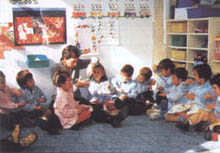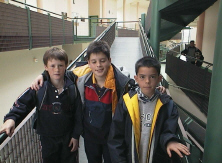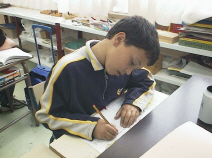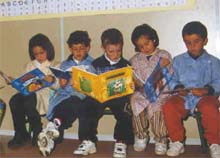|
The
findings from a previous study on the requests of a trilingual
child aged five showed that the child used fewer politeness markers
when speaking to English speaking trilingual children from the
Basque Country than to English-speaking children from Britain
(Barnes 2001). It was suggested that this directness could be
due to pragmatic transfer from Basque into English, since Spanish
has  been
shown to be a direct language and Basque appears to be more direct
than Spanish. The study, although very limited and related to
trilingualism and English, attracted the attention of the Basque
media possibly reflecting public interest in the topic of whether
or not Basque is more direct than other languages and maybe even
concern as to whether Basque children were not as polite as they
might be. As a result of this interest it was decided to conduct
further research into the area, and another study was carried
out to find out the extent to which a sample of Basque children
used politeness markers in Basque in their requests. been
shown to be a direct language and Basque appears to be more direct
than Spanish. The study, although very limited and related to
trilingualism and English, attracted the attention of the Basque
media possibly reflecting public interest in the topic of whether
or not Basque is more direct than other languages and maybe even
concern as to whether Basque children were not as polite as they
might be. As a result of this interest it was decided to conduct
further research into the area, and another study was carried
out to find out the extent to which a sample of Basque children
used politeness markers in Basque in their requests.
The study involved
seventeen children, nine girls and eight boys, in the 5th
year of Primary (aged ten and eleven) in a Model D ikastola. The
children were asked to fill out the part spoken by a child in
a written discourse completion test consisting of ten dialogues.
It has been shown that such tests obtain similar written utterances
in native speakers to those that would have been spoken (Rintell
and Mitchell 1989). The dialogues were contextualised in situations
which were realistic for Basque children such as asking to play
with a friend’s ball, to borrow a pen cil sharpener or friend’s
bike or asking if the friend could tell them the homework and
lend their book. In relation to making requests to adults, the
children had to ask for a glass of water in a bar, ask their teacher
to let them in during break-time to get their swaps, ask the caretaker
who was closing up the sports centre to let them back in to get
their coat, ask a stranger for the time, ask their grandfather
for some pocket money and ask their father to let them stay out
later than usual. It was expected that the children would use
fewer expressions of politeness to their peers and more to adults,
especially if the adult was a stranger and the request involved
a high degree of mitigation, that is to say, that the performance
of the favour requested meant inconveniencing the interlocutor.
Such cases where the request may inconvenience the interlocutor
are termed high constraint.
 The
findings did in fact confirm this, and also revealed some interesting
facts about the politeness of the requests of the children. With
regard to the forms used, all the children invariably used the
interrogative form VERB + iko al didazu (will you ......for
me?) in their requests rather than the imperative, which was only
occasionally found. Use of the past form VERB + ziko al zenidake
(would you ?) to form a conditional downgraded the request making
it more polite and was occasionally found. The use of modals with
speaker dominance (can I?) was found in requests with high degrees
of mitigation (such as asking to go back into the sports centre,
asking the father to stay out late), e.g. joan al naiteke,
hartu al dezaket + justification, sartu al naiteke, joan al naiteke,
Aita egon al naiteke, mesedez egon al naiteke. The
findings did in fact confirm this, and also revealed some interesting
facts about the politeness of the requests of the children. With
regard to the forms used, all the children invariably used the
interrogative form VERB + iko al didazu (will you ......for
me?) in their requests rather than the imperative, which was only
occasionally found. Use of the past form VERB + ziko al zenidake
(would you ?) to form a conditional downgraded the request making
it more polite and was occasionally found. The use of modals with
speaker dominance (can I?) was found in requests with high degrees
of mitigation (such as asking to go back into the sports centre,
asking the father to stay out late), e.g. joan al naiteke,
hartu al dezaket + justification, sartu al naiteke, joan al naiteke,
Aita egon al naiteke, mesedez egon al naiteke.
Interesting patterns
emerged in relation to the politeness marker mesedez. Nearly
half of the questions included the word mesedez (please)
and only one child never used mesedez. It was found that
some children rarely used mesedez whilst others almost
always did, suggesting that the latter group had been explicitly
taught at home (rather than at school) to use mesedez as
a politeness formula. One particular child consistently used the
pattern mesedez + VERB+ iko al didazu + justification
in her requests, again suggesting that this was a politeness formula
she had been taught. The same was true of VERB + iko al zenidake
which tended to be used by individuals Three of the children had
one foreign parent and all of them made frequent use of mesedez.
One of these children, in addition to using mesedez also
used zenidake in the high constraint request for water.
Some children made use of an imperative phrase mitigated by mesedez.
Of the children who used mesedez, there was a tendency
for most of them to use mesedez in final position in the
utterance and to always do so whilst some others preferred the
initial position. Other children varied the position of mesedez
in the utterance. When occasionally used by a child mesedez
in initial position tended to suggest higher constraint, in other
words that the child was trying to be more polite in order to
get what they wanted. All of
the children, except three, used mesedez when asking the
bar-tender for a glass of water. Even one particularly direct
child used mesedez for this request. This is not something
that the author has frequently observed in real life where the
preferred form has appeared to be an imperative ura or
eman ura, the directness of which motivated in part the
present study.
 There
was a clear tendency for the children to use conditionals and
more polite forms with adults or for favours with a high constraint.
For example, the request in which the most variety of polite forms
was found was the one to the father, asking to be allowed to stay
out later than usual. These included use of mesedez and
mesedez aita in initial position in the utterance along
with conditional forms. The youngsters clearly recognised
the importance of asking properly if permission was to be obtained.
The requests to adults for a glass of water, to open the sports
centre and to tell the time were also more polite than the requests
to peers. In the case of asking a stranger for the time a number
of children preceded their requests with markers such as barkatu
(excuse me) or aizu. Requests often included the name of
the person who was being addressed, usually in initial position.
This was found particularly with aita (father) and aitona
(Grandpa) but occasionally in final position such as zer ordu
da andrea? (what is the time ma’am) Interestingly the teacher
did not seem to inspire distance as a higher level of informality
was found with her than with other adults, even family members
like the father and grandfather. There
was a clear tendency for the children to use conditionals and
more polite forms with adults or for favours with a high constraint.
For example, the request in which the most variety of polite forms
was found was the one to the father, asking to be allowed to stay
out later than usual. These included use of mesedez and
mesedez aita in initial position in the utterance along
with conditional forms. The youngsters clearly recognised
the importance of asking properly if permission was to be obtained.
The requests to adults for a glass of water, to open the sports
centre and to tell the time were also more polite than the requests
to peers. In the case of asking a stranger for the time a number
of children preceded their requests with markers such as barkatu
(excuse me) or aizu. Requests often included the name of
the person who was being addressed, usually in initial position.
This was found particularly with aita (father) and aitona
(Grandpa) but occasionally in final position such as zer ordu
da andrea? (what is the time ma’am) Interestingly the teacher
did not seem to inspire distance as a higher level of informality
was found with her than with other adults, even family members
like the father and grandfather.
The high constraint
requests were often justified by the giving of a reason. This
was particularly found amongst the girls. The girls also tended
to be more polite in general than the boys, who used more imperatives,
less mesedez and fewer conditionals.
 In
sum, it can be seen that this group of Basque children were aware
of the importance of politeness. Although every attempt was made
to ensure that the children did not realise that they were being
tested on their politeness there is a remote possibility that
they were aware of this. Nevertheless this does not detract from
the findings that demonstrate that a variety of forms are recognised
as polite by most of the children and they use them according
to the constraint imposed by the status, distance or not of the
interlocutor and the degree of inconvenience likely to be caused
by the request. It would be interesting to carry out research
on further groups of Basque children and compare them with samples
from Spanish and English children, for example, to see if Basque
children are more direct. However, we cannot ignore the fact that
the children in our sample are bilingual and therefore may show
influence from Spanish in their levels of politeness. Unfortunately,
as there are no monolingual Basque speakers, we cannot easily
separate the two languages at a pragmatic level to examine the
directness of Basque without also considering Spanish. In
sum, it can be seen that this group of Basque children were aware
of the importance of politeness. Although every attempt was made
to ensure that the children did not realise that they were being
tested on their politeness there is a remote possibility that
they were aware of this. Nevertheless this does not detract from
the findings that demonstrate that a variety of forms are recognised
as polite by most of the children and they use them according
to the constraint imposed by the status, distance or not of the
interlocutor and the degree of inconvenience likely to be caused
by the request. It would be interesting to carry out research
on further groups of Basque children and compare them with samples
from Spanish and English children, for example, to see if Basque
children are more direct. However, we cannot ignore the fact that
the children in our sample are bilingual and therefore may show
influence from Spanish in their levels of politeness. Unfortunately,
as there are no monolingual Basque speakers, we cannot easily
separate the two languages at a pragmatic level to examine the
directness of Basque without also considering Spanish.
|
REFERENCES
Barnes, J. (2001) Politeness
in English, Basque and Spanish: evidence from a trilingual
child. Jakingarriak, 45, 40-45.
Rintell, E. and Mitchell,
S. (1989) Studying requests and apologies: an inquiry
into method. In S. Blum-Kulka, J. House and G. Kasper
(eds.) Cross-cultural Pragmatics: requests and
apologies. 248-272. New Jersey: Ablex. |
|
Julia Barnes is a lecturer in the Language
Department of Mondragón University
With thanks to Aranzazu Uribe-Etxeberría and her pupils for
their assistance in the data collection.
Pictures: Ikastola Muskiz, Erentzun (Biana) and Elizalde Herri Eskola
(Oiartzun) |


 been
shown to be a direct language and Basque appears to be more direct
than Spanish. The study, although very limited and related to
trilingualism and English, attracted the attention of the Basque
media possibly reflecting public interest in the topic of whether
or not Basque is more direct than other languages and maybe even
concern as to whether Basque children were not as polite as they
might be. As a result of this interest it was decided to conduct
further research into the area, and another study was carried
out to find out the extent to which a sample of Basque children
used politeness markers in Basque in their requests.
been
shown to be a direct language and Basque appears to be more direct
than Spanish. The study, although very limited and related to
trilingualism and English, attracted the attention of the Basque
media possibly reflecting public interest in the topic of whether
or not Basque is more direct than other languages and maybe even
concern as to whether Basque children were not as polite as they
might be. As a result of this interest it was decided to conduct
further research into the area, and another study was carried
out to find out the extent to which a sample of Basque children
used politeness markers in Basque in their requests. The
findings did in fact confirm this, and also revealed some interesting
facts about the politeness of the requests of the children. With
regard to the forms used, all the children invariably used the
interrogative form VERB + iko al didazu (will you ......for
me?) in their requests rather than the imperative, which was only
occasionally found. Use of the past form VERB + ziko al zenidake
(would you ?) to form a conditional downgraded the request making
it more polite and was occasionally found. The use of modals with
speaker dominance (can I?) was found in requests with high degrees
of mitigation (such as asking to go back into the sports centre,
asking the father to stay out late), e.g. joan al naiteke,
hartu al dezaket + justification, sartu al naiteke, joan al naiteke,
Aita egon al naiteke, mesedez egon al naiteke.
The
findings did in fact confirm this, and also revealed some interesting
facts about the politeness of the requests of the children. With
regard to the forms used, all the children invariably used the
interrogative form VERB + iko al didazu (will you ......for
me?) in their requests rather than the imperative, which was only
occasionally found. Use of the past form VERB + ziko al zenidake
(would you ?) to form a conditional downgraded the request making
it more polite and was occasionally found. The use of modals with
speaker dominance (can I?) was found in requests with high degrees
of mitigation (such as asking to go back into the sports centre,
asking the father to stay out late), e.g. joan al naiteke,
hartu al dezaket + justification, sartu al naiteke, joan al naiteke,
Aita egon al naiteke, mesedez egon al naiteke. There
was a clear tendency for the children to use conditionals and
more polite forms with adults or for favours with a high constraint.
For example, the request in which the most variety of polite forms
was found was the one to the father, asking to be allowed to stay
out later than usual. These included use of mesedez and
mesedez aita in initial position in the utterance along
with conditional forms. The youngsters clearly recognised
the importance of asking properly if permission was to be obtained.
The requests to adults for a glass of water, to open the sports
centre and to tell the time were also more polite than the requests
to peers. In the case of asking a stranger for the time a number
of children preceded their requests with markers such as barkatu
(excuse me) or aizu. Requests often included the name of
the person who was being addressed, usually in initial position.
This was found particularly with aita (father) and aitona
(Grandpa) but occasionally in final position such as zer ordu
da andrea? (what is the time ma’am) Interestingly the teacher
did not seem to inspire distance as a higher level of informality
was found with her than with other adults, even family members
like the father and grandfather.
There
was a clear tendency for the children to use conditionals and
more polite forms with adults or for favours with a high constraint.
For example, the request in which the most variety of polite forms
was found was the one to the father, asking to be allowed to stay
out later than usual. These included use of mesedez and
mesedez aita in initial position in the utterance along
with conditional forms. The youngsters clearly recognised
the importance of asking properly if permission was to be obtained.
The requests to adults for a glass of water, to open the sports
centre and to tell the time were also more polite than the requests
to peers. In the case of asking a stranger for the time a number
of children preceded their requests with markers such as barkatu
(excuse me) or aizu. Requests often included the name of
the person who was being addressed, usually in initial position.
This was found particularly with aita (father) and aitona
(Grandpa) but occasionally in final position such as zer ordu
da andrea? (what is the time ma’am) Interestingly the teacher
did not seem to inspire distance as a higher level of informality
was found with her than with other adults, even family members
like the father and grandfather. In
sum, it can be seen that this group of Basque children were aware
of the importance of politeness. Although every attempt was made
to ensure that the children did not realise that they were being
tested on their politeness there is a remote possibility that
they were aware of this. Nevertheless this does not detract from
the findings that demonstrate that a variety of forms are recognised
as polite by most of the children and they use them according
to the constraint imposed by the status, distance or not of the
interlocutor and the degree of inconvenience likely to be caused
by the request. It would be interesting to carry out research
on further groups of Basque children and compare them with samples
from Spanish and English children, for example, to see if Basque
children are more direct. However, we cannot ignore the fact that
the children in our sample are bilingual and therefore may show
influence from Spanish in their levels of politeness. Unfortunately,
as there are no monolingual Basque speakers, we cannot easily
separate the two languages at a pragmatic level to examine the
directness of Basque without also considering Spanish.
In
sum, it can be seen that this group of Basque children were aware
of the importance of politeness. Although every attempt was made
to ensure that the children did not realise that they were being
tested on their politeness there is a remote possibility that
they were aware of this. Nevertheless this does not detract from
the findings that demonstrate that a variety of forms are recognised
as polite by most of the children and they use them according
to the constraint imposed by the status, distance or not of the
interlocutor and the degree of inconvenience likely to be caused
by the request. It would be interesting to carry out research
on further groups of Basque children and compare them with samples
from Spanish and English children, for example, to see if Basque
children are more direct. However, we cannot ignore the fact that
the children in our sample are bilingual and therefore may show
influence from Spanish in their levels of politeness. Unfortunately,
as there are no monolingual Basque speakers, we cannot easily
separate the two languages at a pragmatic level to examine the
directness of Basque without also considering Spanish.